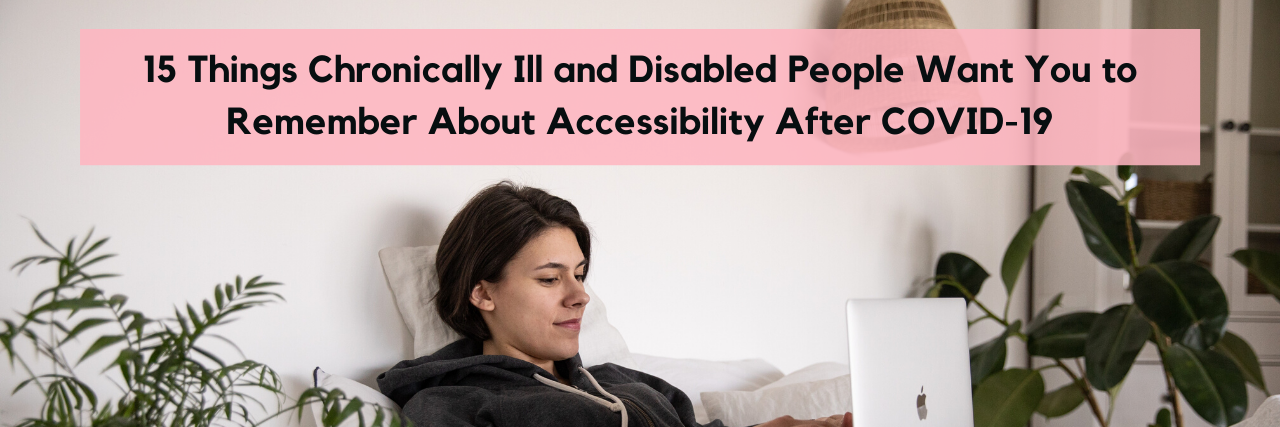15 Things Chronically Ill and Disabled People Want You to Remember About Accessibility After COVID-19
Editor's Note
Join The Mighty’s Coronavirus group to connect with other Mighties living through the pandemic. Read the latest updates, share helpful tips, or give and receive virtual support.
Over the past few months as many people are self-isolating or in quarantine due to the coronavirus, many jobs, activities and doctors’ appointments have shifted online. While it is great that people and companies have found ways to adapt, members of the disability and chronic illness community have been asking for these accommodations for years.
Many employers, offices and other settings were unwilling to make these same accommodations pre-COVID-19. From respecting people’s personal space to hosting virtual events, we now know that it is definitely possible to honor requests that disabled and chronically ill people make — and many accommodations are good for everyone.
We asked members of the chronic illness and disability community to share what they hope people remember as regions around the world start lifting restrictions to maintain accommodations.
Here is what they had to say:
1. It’s easy to work from home.
“I want companies to remember how easy it was to work from home, even if they offer ‘work from home days’ one or two days a week. It is more inclusive for everyone.” – Crystal O.
“It’s possible to find a job within a company that allows me to work from home and be flexible in my shift patterns.” – Tash B.
“I have been asking to work from home but told it was not possible. I can’t work full-time, and I can’t wait at my desk for more than 20 minutes without pain.” – Kacey J.
2. Delivery isn’t ‘lazy.’
“It’s been great being able to have everything delivered without that suspicious ‘are you just lazy’ look.” – Jackie S.
“I appreciate the convenience of easy picks ups and deliveries.” – Michele L.
3. Isolation is difficult.
“Check-in with me once in a while. Don’t assume that I didn’t show up because I’m snubbing you. I may be having trouble that day.” – Tammy R.
“How it feels to be home all the time and not be able to go anywhere.” – Sabrina M.
4. Virtual appointments can be more accessible.
“Virtual doctor and counseling appointments allow accessibility to people who otherwise often struggle to coordinate getting to appointments.” – Sarah G
“I would love for telemedicine to stay a thing. It’s so much easier, especially since my disabilities keep me from driving.” – Shayla S.
5. There’s symptoms you can’t see.
“Don’t judge people using [accessible] parking spots or elevators. They might be dealing with very difficult symptoms that you can’t see from the outside.” – Lauren B.
“Like germs and viruses, not all disabilities are visible.” – Cheryl A.
6. Respect personal space.
“Respect my space and don’t touch me randomly. Some people like walking up to me and just laying their hand on my shoulder or just hugging me out of nowhere.” – Julia M.
“Respect space and don’t crowd people.” – Natasha S.
7. I’m prioritizing my health.
“I want people to stop saying I am living in fear. I’m not afraid. I am just doing what is smart to stay healthy for me and my family.” – Kelly D.
8. Masks matter.
“Masks matter and can prevent people from spreading colds and other viruses.” – Sarah G.
“I want not to be judged when walking with a mask.” – Lil S.
9. Virtual events should not end.
“Virtual events should not end when this pandemic is over. Virtual options should remain open so that those with chronic illnesses and disabilities can attend.” – Kate S.
10. I have a constant fever.
“I have a constant fever. If you check mine before allowing me to enter a store, I won’t be able to enter any.” – Linda N.
11. It’s not anyone’s fault if they need assistance.
“That it’s not my fault or anyone’s fault if they need assistance of any kind. You have to stay home, and everyone is perfectly okay with it. People understand it. I only wish people believed the same for those with ME/CFS.” – Alexandria M.
12. Wash your hands.
“Please wash your hands when you come to see me.” – Peggy D.
“Keep washing your hands constantly, use hand sanitizer, and always sanitize frequently touched surfaces.” – Liz T.
13. Productivity isn’t everything.
“Remember that time does not have to be filled with productivity in order for a life to have value. And as such, there are better ways to engage in conversation with those who can no longer work than by asking, ‘So what do you do with all that free time?'” – Scott W.
14. Do not touch any assistance dog.
“Do not touch any assistance dog in any vest or harness. It’s not just to keep the virus off their kit and fur so they don’t have to be bathed as soon as they get home. You should never ever touch or talk to or try to lure away any type of assistance dog ever.” – Jennie H.
15. Help us when you can.
“I didn’t choose to have a condition that puts me at a higher risk should I catch the virus. As things start opening back up, please keep in mind those of us at higher risk and continue to help us out where you can.” – Elizabeth Y.
What do you want people to remember about accessibility after COVID-19?
Image via Pexels/Ekaterina Bolovtsova

